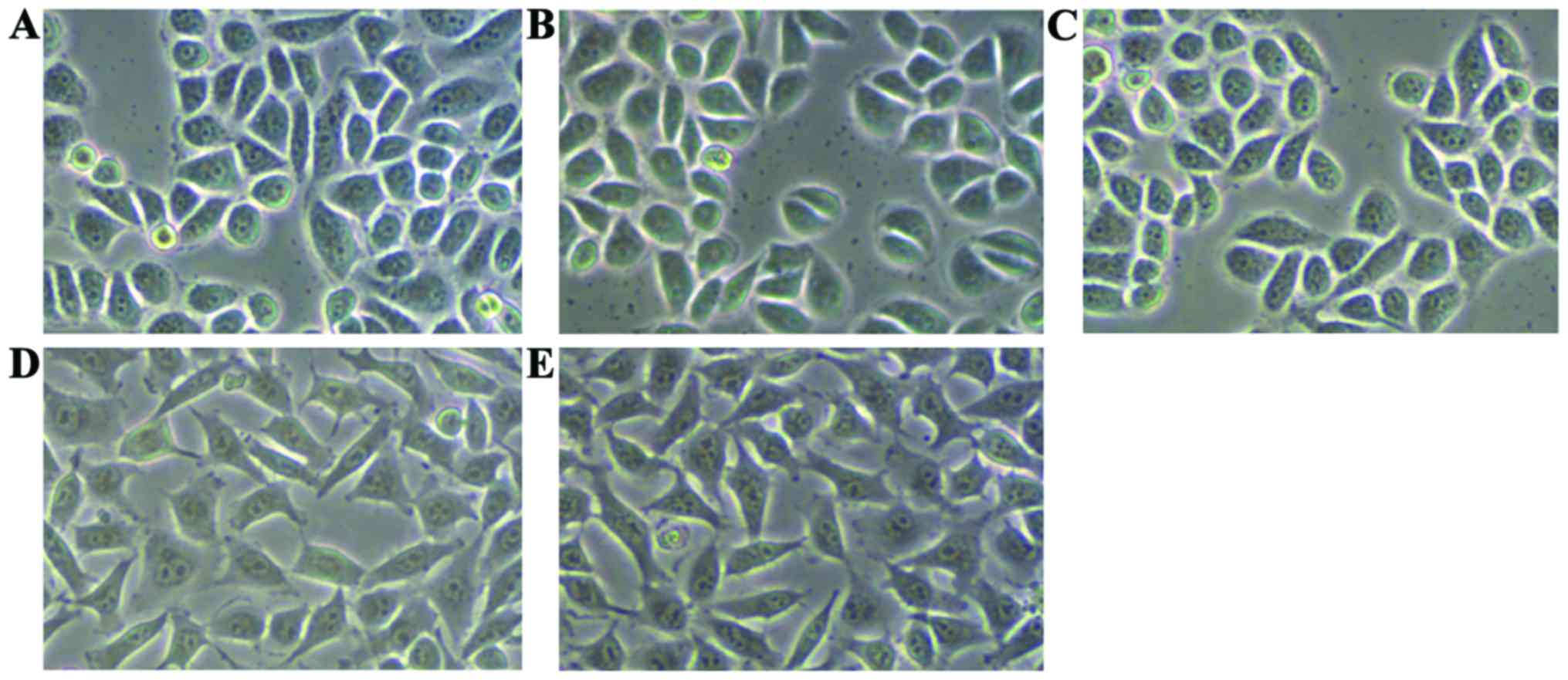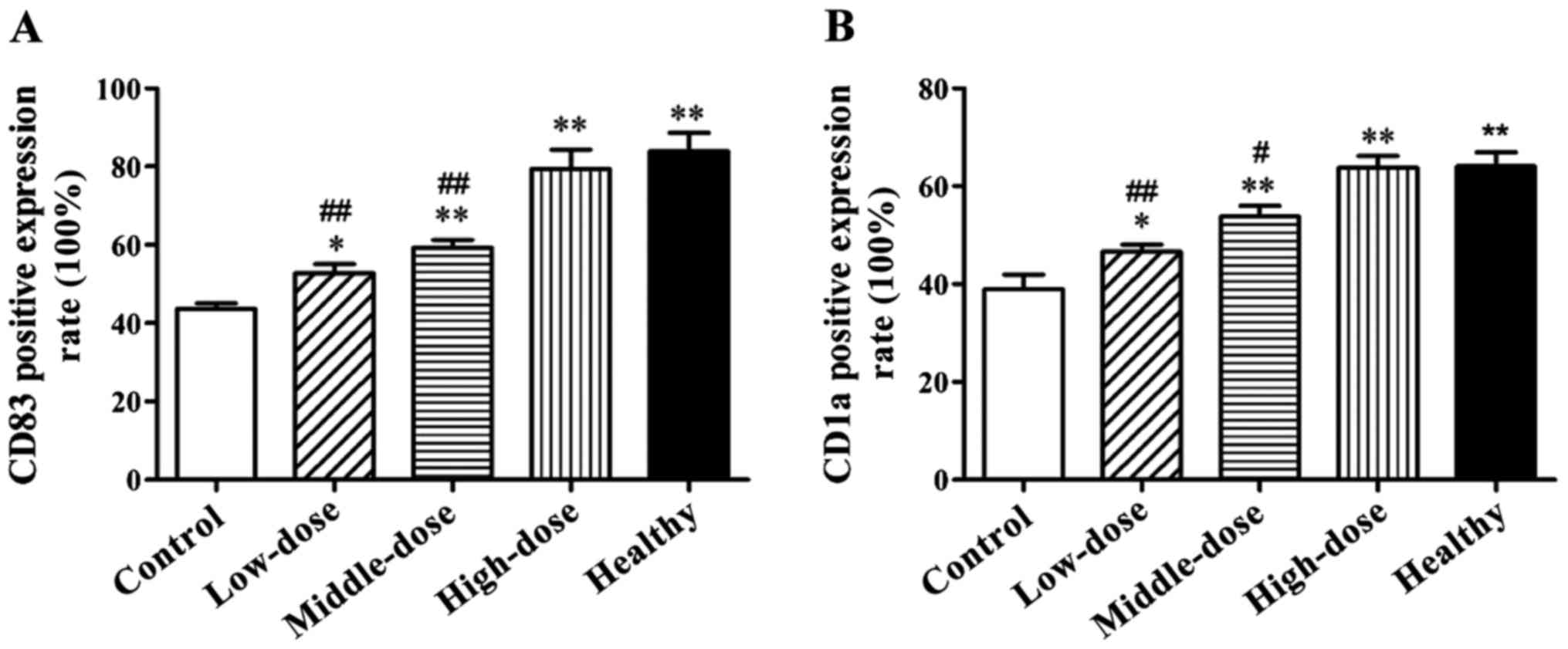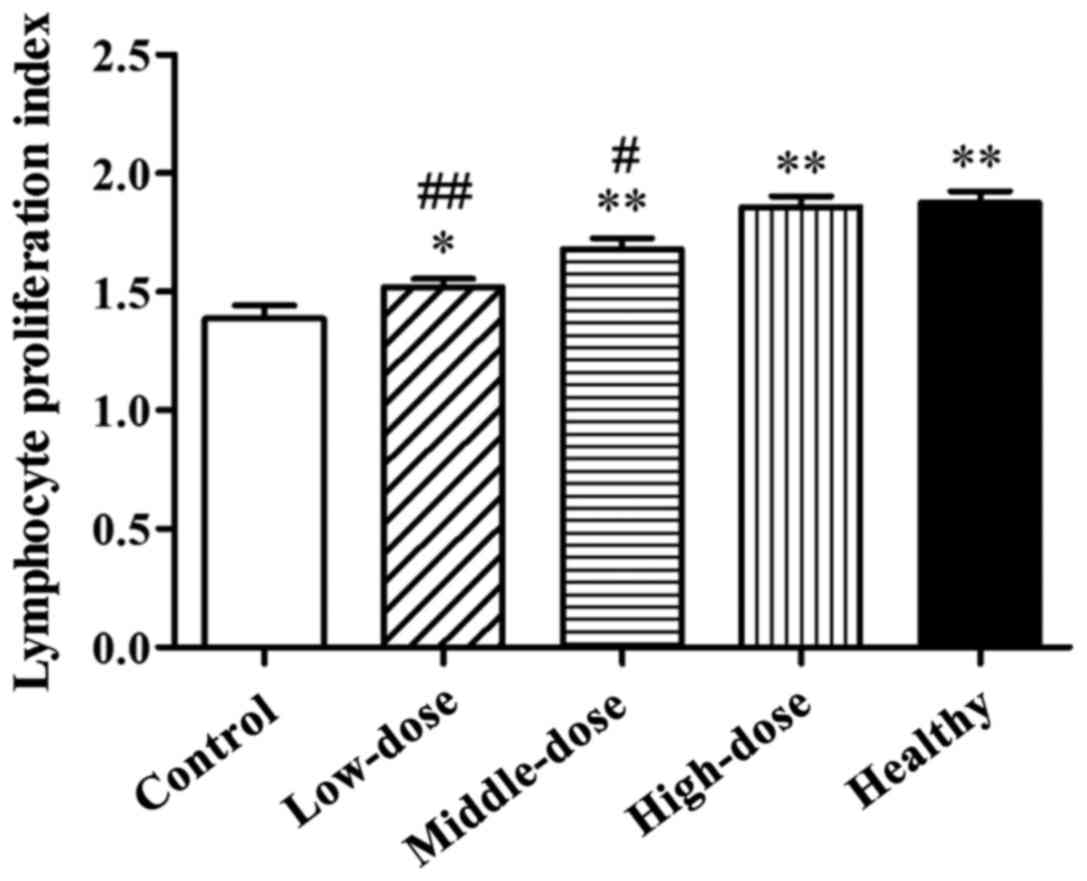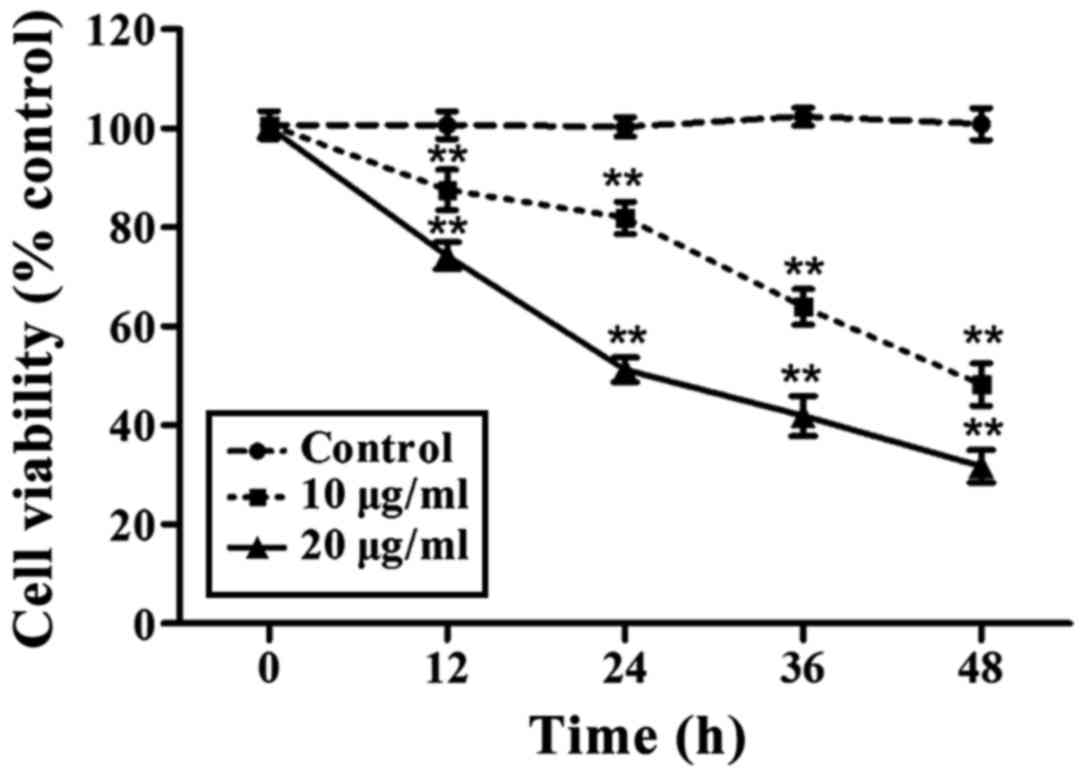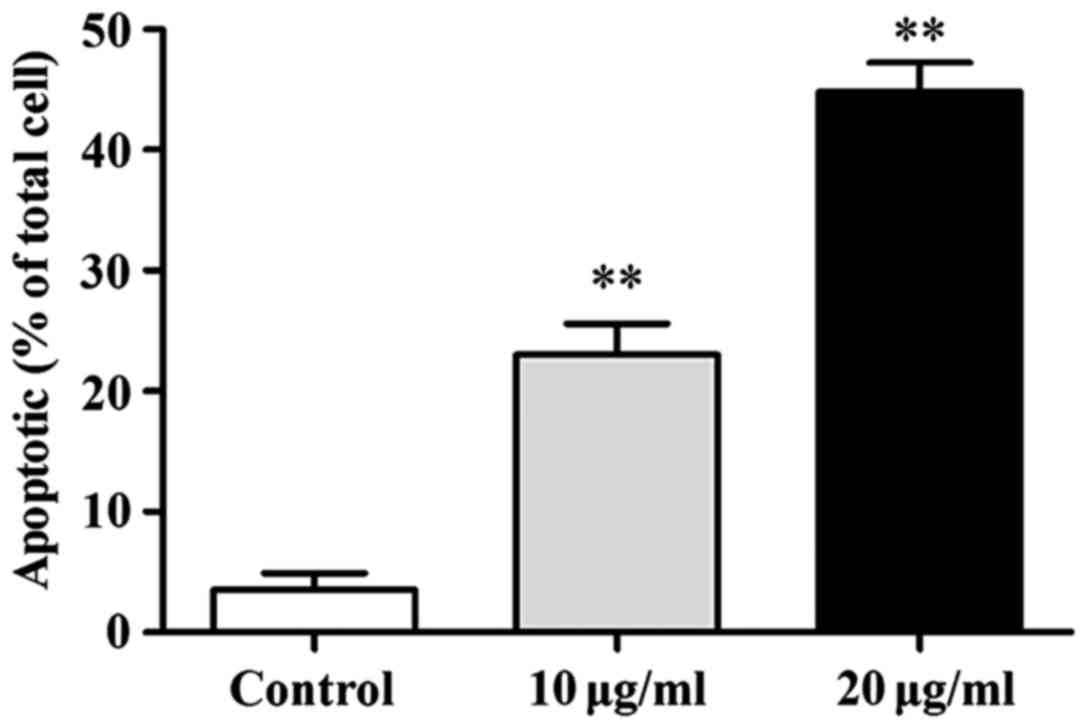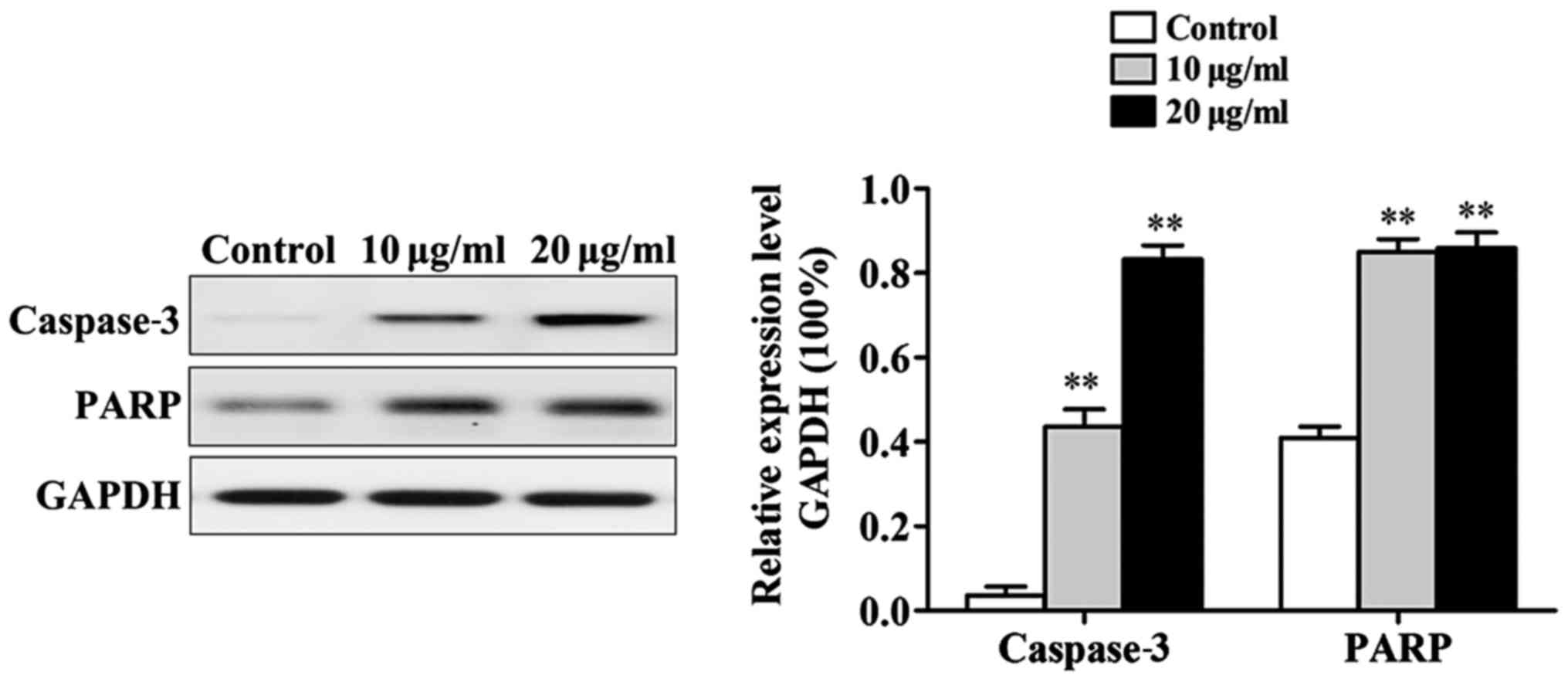|
1
|
Trinchieri G and Sher A: Cooperation of
Toll-like receptor signals in innate immune defence. Nat Rev
Immunol. 7:179–190. 2007. View
Article : Google Scholar : PubMed/NCBI
|
|
2
|
Kawai T and Akira S: TLR signaling. Semin
Immunol. 19:24–32. 2007. View Article : Google Scholar : PubMed/NCBI
|
|
3
|
Krieg AM: Therapeutic potential of
Toll-like receptor 9 activation. Nat Rev Drug Discov. 5:471–484.
2006. View
Article : Google Scholar : PubMed/NCBI
|
|
4
|
Inaba K, Pack M, Inaba M, Sakuta H, Isdell
F and Steinman RM: High levels of a major histocompatibility
complex II-self peptide complex on dendritic from the T cell areas
of lymph node. J Exp Med. 186:665–672. 1997. View Article : Google Scholar : PubMed/NCBI
|
|
5
|
Pirtskhalaishvili G, Shurin GV, Gambotto
A, Esche C, Wahl M, Yurkovetsky ZR, Robbins PD and Shurin MR:
Transduction of dendritic cells with Bcl-xL increases their
resistance to prostate cancer-induced apoptosis and antitumor
effect in mice. J Immunol. 165:1956–1964. 2000. View Article : Google Scholar : PubMed/NCBI
|
|
6
|
Inoue K, Yamashita A, Yamashita M, Morioka
M, Fujita Y and Terao N: Distribution of S-100 protein-positive
dendritic cells inside the cancer nest and expression of HLA-DR
antigen and blood group antigen on the cancer cell in transitional
cell carcinoma of the urinary bladder - in relation to tumor
progression and prognosis. Nihon Hinyokika Gakkai Zasshi 85:
495–503, 1994. Nihon Hinyokika Gakkai Zasshi 85: 495–503, 1994. 85:
495–503, 1994:495-503, 1994–503, 1994. 1994.(In Japanese).
|
|
7
|
Troy AJ, Davidson PJ, Atkinson CH and Hart
DN: CD1a dendritic cells predominate in transitional cell carcinoma
of bladder and kidney but are minimally activated. J Urol.
161:1962–1967. 1999. View Article : Google Scholar : PubMed/NCBI
|
|
8
|
Wang CC, Wu CH, Hsieh KJ, Yen KY and Yang
LL: Cytotoxic effects of cantharidin on the growth of normal and
carcinoma cells. Toxicology. 147:77–87. 2000. View Article : Google Scholar : PubMed/NCBI
|
|
9
|
Efferth T, Davey M, Olbrich A, Rücker G,
Gebhart E and Davey R: Activity of drugs from traditional Chinese
medicine toward sensitive and MDR1- or MRP1-overexpressing
multidrug-resistant human CCRF-CEM leukemia cells. Blood Cells Mol
Dis. 28:160–168. 2002. View Article : Google Scholar : PubMed/NCBI
|
|
10
|
Kok SH, Hong CY, Kuo MY, Lee CH, Lee JJ,
Lou IU, Lee MS, Hsiao M and Lin SK: Comparisons of norcantharidin
cytotoxic effects on oral cancer cells and normal buccal
keratinocytes. Oral Oncol. 39:19–26. 2003. View Article : Google Scholar : PubMed/NCBI
|
|
11
|
McCluskey A, Ackland SP, Bowyer MC,
Baldwin ML, Garner J, Walkom CC and Sakoff JA: Cantharidin
analogues: Synthesis and evaluation of growth inhibition in a panel
of selected tumour cell lines. Bioorg Chem. 31:68–79. 2003.
View Article : Google Scholar : PubMed/NCBI
|
|
12
|
Verma AK and Prasad SB: Changes in
glutathione, oxidative stress and mitochondrial membrane potential
in apoptosis involving the anticancer activity of cantharidin
isolated from redheaded blister beetles, Epicauta hirticornis.
Anticancer Agents Med Chem. 13:1096–1114. 2013. View Article : Google Scholar : PubMed/NCBI
|
|
13
|
Li W, Xie L, Chen Z, Zhu Y, Sun Y, Miao Y,
Xu Z and Han X: Cantharidin, a potent and selective PP2A inhibitor,
induces an oxidative stress-independent growth inhibition of
pancreatic cancer cells through G2/M cell-cycle arrest and
apoptosis. Cancer Sci. 101:1226–1233. 2010. View Article : Google Scholar : PubMed/NCBI
|
|
14
|
Chen X, Qiu J, Yang D, Lu J, Yan C, Zha X
and Yin Y: MDM2 promotes invasion and metastasis in invasive ductal
breast carcinoma by inducing matrix metalloproteinase-9. PLoS One.
8:e787942013. View Article : Google Scholar : PubMed/NCBI
|
|
15
|
Zhan YP, Huang XE, Cao J, Lu YY, Wu XY,
Liu J, Xu X, Xu L, Xiang J and Ye LH: Clinical study on safety and
efficacy of Qinin® (cantharidin sodium) injection
combined with chemotherapy in treating patients with gastric
cancer. Asian Pac J Cancer Prev. 13:4773–4776. 2012. View Article : Google Scholar : PubMed/NCBI
|
|
16
|
Liu ZY, Qiu HO, Yuan XJ, Ni YY, Sun JJ,
Jing W and Fan YZ: Suppression of lymphangiogenesis in human
lymphatic endothelial cells by simultaneously blocking VEGF-C and
VEGF-D/VEGFR-3 with norcantharidin. Int J Oncol. 41:1762–1772.
2012. View Article : Google Scholar : PubMed/NCBI
|
|
17
|
Shou LM, Zhang QY, Li W, Xie X, Chen K,
Lian L, Li ZY, Gong FR, Dai KS, Mao YX, et al: Cantharidin and
norcantharidin inhibit the ability of MCF-7 cells to adhere to
platelets via protein kinase C pathway-dependent downregulation of
α2 integrin. Oncol Rep. 30:1059–1066. 2013. View Article : Google Scholar : PubMed/NCBI
|
|
18
|
Kunitani H, Shimizu Y, Murata H, Higuchi K
and Watanabe A: Phenotypic analysis of circulating and intrahepatic
dendritic cell subsets in patients with chronic liver diseases. J
Hepatol. 36:734–741. 2002. View Article : Google Scholar : PubMed/NCBI
|
|
19
|
Szabolcs P, Moore MA and Young JW:
Expansion of immunostimulatory dendritic cells among the myeloid
progeny of human CD34+ bone marrow precursors cultured with c-kit
ligand, granulocyte-macrophage colony-stimulating factor, and
TNF-alpha. J Immunol. 154:5851–5861. 1995.PubMed/NCBI
|
|
20
|
Rodríguez-Fernández JL and Corbí AL:
Adhesion molecules in human dendritic cells. Curr Opin Investig
Drugs. 6:1103–1111. 2005.PubMed/NCBI
|
|
21
|
Anguille S, Smits EL, Lion E, van Tendeloo
VF and Berneman ZN: Clinical use of dendritic cells for cancer
therapy. Lancet Oncol. 15:e257–e267. 2014. View Article : Google Scholar : PubMed/NCBI
|
|
22
|
Collins LE, DeCourcey J, di Luca M
Soledad, Rochfort KD and Loscher CE: An emerging role for SNARE
proteins in dendritic cell function. Front Immunol. 6:133–139.
2015. View Article : Google Scholar : PubMed/NCBI
|
|
23
|
Schmitt N and Ueno H: Regulation of human
helper T cell subset differentiation by cytokines. Curr Opin
Immunol. 34:130–136. 2015. View Article : Google Scholar : PubMed/NCBI
|
|
24
|
Rouard H, Léon A, Klonjkowski B, Marquet
J, Tennezé L, Plonquet A, Agrawal SG, Abastado JP, Eloit M, Farcet
JP, et al: Adenoviral transduction of human ‘clinical grade’
immature dendritic cells enhances costimulatory molecule expression
and T-cell stimulatory capacity. J Immunol Methods. 241:69–81.
2000. View Article : Google Scholar : PubMed/NCBI
|
|
25
|
Daneiger J Seager, Lutz M, Hama S, Cruz D,
Castrillo A, Lazaro J, Phillips R, Prernack B and Berliner J:
Method for large scale isolation, culture and cryopreservation of
human monocytes suitable for ehemotaxis, cellular adhesion assays,
maerophage and dendritic eell differentiation. J Immunol Methods.
288:123–134. 2004. View Article : Google Scholar : PubMed/NCBI
|
|
26
|
Li Z, Jo J, Jia JM, Lo SC, Whitcomb DJ,
Jiao S, Cho K and Sheng M: Caspase-3 activation via mitochondria is
required for long-term depression and AMPA receptor
internalization. Cell. 141:859–871. 2010. View Article : Google Scholar : PubMed/NCBI
|















